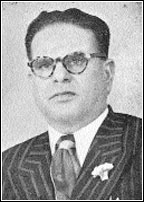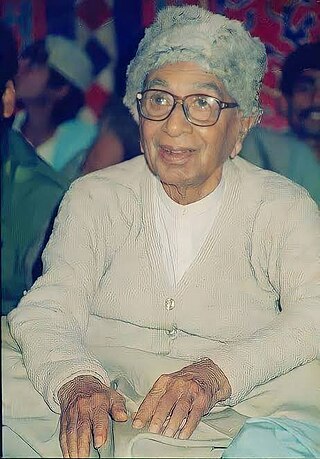
Sindh is a province of Pakistan. Located in the southeastern region of the country, Sindh is the third-largest province of Pakistan by land area and the second-largest province by population after Punjab. It is bordered by the Pakistani provinces of Balochistan to the west and north-west and Punjab to the north. It shares an International border with the Indian states of Gujarat and Rajasthan to the east; it is also bounded by the Arabian Sea to the south. Sindh's landscape consists mostly of alluvial plains flanking the Indus River, the Thar Desert in the eastern portion of the province along the international border with India, and the Kirthar Mountains in the western portion of the province.

Sind was a province of British India from 1 April 1936 to 1947 and Dominion of Pakistan from 14 August 1947 to 14 October 1955. Under the British, it encompassed the current territorial limits excluding the princely state of Khairpur. Its capital was Karachi. After Pakistan's creation, the province lost the city of Karachi, as it became the capital of the newly created country. It became part of West Pakistan upon the creation of the One Unit Scheme.

Sindhis are an Indo-Aryan ethnolinguistic group who speak the Sindhi language and are native to the Pakistani province of Sindh. The historical homeland of Sindhis is bordered by the southeastern part of Balochistan, the Bahawalpur region of Punjab and the Kutch region of Gujarat. Having been isolated throughout history unlike its neighbours, Sindhi culture has preserved its own uniqueness.

The All-India Muslim League (AIML) was a political party established in Dhaka in 1906 when some well-known Muslim politicians met the Viceroy of British India, Lord Minto, with the goal of securing Muslim interests on the Indian subcontinent.
Shah Nawaz Bhutto, was a politician and a member of Bhutto family hailing from Larkana in the Sind region of the Bombay Presidency of British India, which is now Sindh, Pakistan.

The Lahore Resolution, also called Pakistan Resolution, was written and prepared by Muhammad Zafarullah Khan and was presented by A. K. Fazlul Huq, the Prime Minister of Bengal, was a formal political statement adopted by the All-India Muslim League on the occasion of its three-day general session in Lahore on 22–24 March 1940. The resolution called for independent states as seen by the statement:
That geographically contiguous units are demarcated regions which should be constituted, with such territorial readjustments as may be necessary that the areas in which the Muslims are numerically in a majority as in the North Western and Eastern Zones of (British) India should be grouped to constitute ‘independent states’ in which the constituent units should be autonomous and sovereign.

The Provincial Assembly of Sindh is a unicameral legislature of elected representatives of the Pakistani province of Sindh, and is located in Karachi, its provincial capital. It was established under Article 106 of the Constitution of Pakistan having a total of 168 seats, with 130 general seats, 29 seats reserved for women and 9 seats reserved for non-Muslims.
Sir Ghulam Hussain Hidayatullah KCSI was a colonial Indian and Pakistani politician from Sindh. He held several offices in Sindh including 1st Chief Minister (1937–1938) and being re-elected as 5th Chief Minister (1942–1947).
Allah Bux Muhammad Umar Soomro, or Allah Baksh Soomro, was a zamindar, government contractor, Indian independence activist and politician from the province of Sindh in colonial India. He is considered to be amongst the best premiers of the province, known for promoting Hindu-Muslim unity and campaigning for an independent, united India. He was referred to as Shaheed or "martyr".

Muhammad Hashim Gazdar was one of the three representatives from Sindh to the Constituent Assembly of Pakistan, and the second Deputy Speaker of the National Assembly of Pakistan.

Ghulam Murtaza Syed, commonly known as G. M. Syed, was a Pakistani politician from Sindh, who is known for his efforts in passing a resolution in favour of the independence of Pakistan in the Sind Assembly during the British Raj. He later proposed an ideological groundwork for separate Sindhi identity and laying the foundations of the Sindhudesh movement. He is regarded as one of the founding fathers of modern Sindhi nationalism.
The Sind United Party or Sind Ittehad Party was a political party in Sind, British India. The party was founded in June 1936, the same year that the Sind province had been created. The party was modelled on the Punjab Unionist Party. In the 1937 election to the Sind Legislative Assembly, the party emerged as the largest party with 21 seats in the Assembly and formed a provincial government.

Provincial elections were held in British India in the winter of 1936-37 as mandated by the Government of India Act 1935. Elections were held in eleven provinces - Madras, Central Provinces, Bihar, Orissa, the United Provinces, the Bombay Presidency, Assam, the North-West Frontier Province, Bengal, Punjab and Sind.

Muhammad Ali Jinnah was a barrister, politician and the founder of Pakistan. Jinnah served as the leader of the All-India Muslim League from 1913 until the inception of Pakistan on 14 August 1947, and then as the Dominion of Pakistan's first governor-general until his death.

Sir Abdullah Haroon was a British Indian politician and businessman who made major contributions towards developing and defining the role of Muslims in economic, educational, social and political fields in the Indian subcontinent.
Ghulam Muhammad Khan Bhurgri (Barrister),(1878-1924) was a Sindhi statesman.
Shaikh Abdul Majeed Sindhi a famous writer, politician, journalist of Sindh.
Noor Muhammad Lakhair was a Sindhi nationalist, educator, freedom fighter, social activist, and founder of Noor Muhammad High School and the Muslim Hostel in Hyderabad, Sindh.

The Bengal Provincial Muslim League (BPML) was the branch of the All India Muslim League in the British Indian province of Bengal. It was established in Dhaka on 2 March 1912. Its official language was Bengali. The party played an important role in the Bengal Legislative Council and in the Bengal Legislative Assembly, where two of the Prime Ministers of Bengal were from the party. It was vital to the creation of the Dominion of Pakistan, particularly after its election victory in 1946.
Abdul Sattar Pirzada was a Pakistani politician and administrator who served as the Chief Minister of Sindh between May 1953 and November 1954. He also served as the Chairman of the Pakistan Cricket Board (PCB) between September 1951 and July 1953 before becoming chief minister. His son, Abdul Hafeez Pirzada, is known as the architect of Constitution of Pakistan.












